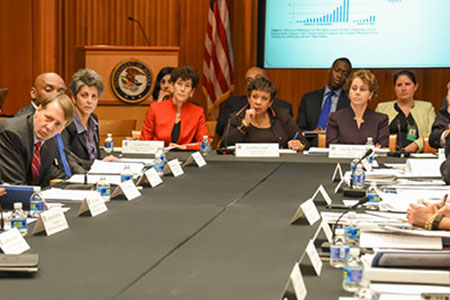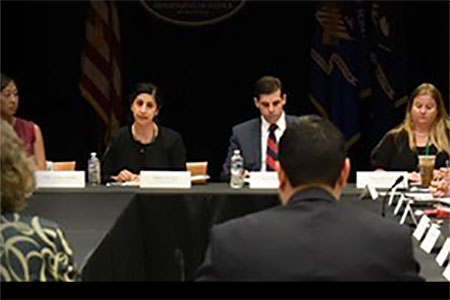LAIR Archive

On April 11, 2018 the Justice Department announced on the Office for Legal Policy (OLP) website that OLP "has assumed the principal policy and legislative responsibilities of the Office for Access to Justice." With LAIR's future now uncertain JGP has assembled LAIR-related documents and blogs below.
In 2012, more than a dozen federal agencies came together under the leadership of the White House Domestic Policy Council and the U.S. Department of Justice (DOJ) to launch the Legal Aid Interagency Roundtable (LAIR). The purpose was to raise federal agencies' awareness of how civil legal aid can help advance a wide range of federal objectives including employment, family stability, housing, consumer protection, and public safety. With support from DOJ's Office for Access to Justice (ATJ), which until 2018 staffed LAIR, participating agencies worked with civil legal aid partners, including non-profit organizations, law schools, and the private bar, to (1) leverage resources to strengthen Federal programs by incorporating legal aid, (2) develop policy recommendations that improve access to justice, (3) facilitate strategic partnerships to achieve enforcement and outreach objectives, and (4) advance evidence-based research, data collection, and analysis.
LAIR was formally established in a 2015 Presidential Memorandum, and its list of federal partners grew to include 22 agencies. In November 2016, LAIR issued its first annual report, which documents how LAIR has worked over the past few years to inspire innovative interagency collaborations to more effectively support underserved individuals.

As of April 2018, participating LAIR agencies included:
Administrative Conference of the United States
U.S. Agency for International Development
Consumer Financial Protection Bureau
Corporation for National and Community Service
U.S. Department of Agriculture
U.S. Department of Education
U.S. Department of Health and Human Services
U.S. Department of Homeland Security
U.S. Department of Housing and Urban Development
U.S. Department of the Interior
U.S. Department of Justice
U.S. Department of Labor
U.S. Department of State
U.S. Department of the Treasury
U.S. Department of Veterans Affairs
Equal Employment Opportunity Commission
Federal Communications Commission
Federal Trade Commission
Legal Services Corporation
National Science Foundation
Office of Management and Budget
Social Security Administration